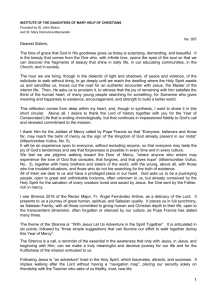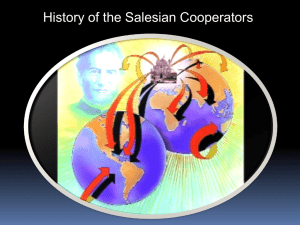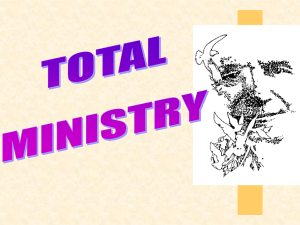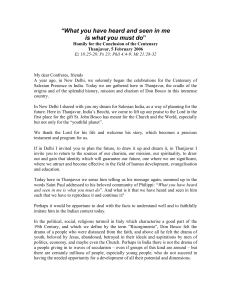Xem tài li?u Microsoft Word
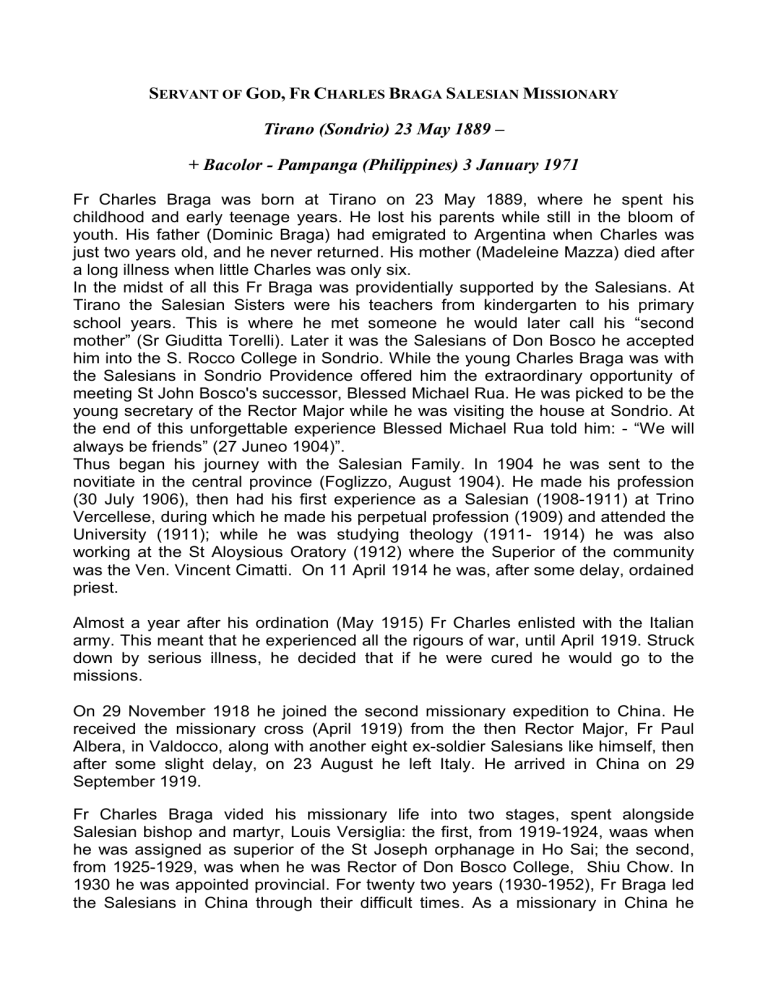
S ERVANT OF G OD , F R C HARLES B RAGA S ALESIAN M ISSIONARY
Tirano (Sondrio) 23 May 1889 –
+ Bacolor - Pampanga (Philippines) 3 January 1971
Fr Charles Braga was born at Tirano on 23 May 1889, where he spent his childhood and early teenage years. He lost his parents while still in the bloom of youth. His father (Dominic Braga) had emigrated to Argentina when Charles was just two years old, and he never returned. His mother (Madeleine Mazza) died after a long illness when little Charles was only six.
In the midst of all this Fr Braga was providentially supported by the Salesians. At
Tirano the Salesian Sisters were his teachers from kindergarten to his primary school years. This is where he met someone he would later call his “second mother ” (Sr Giuditta Torelli). Later it was the Salesians of Don Bosco he accepted him into the S. Rocco College in Sondrio. While the young Charles Braga was with the Salesians in Sondrio Providence offered him the extraordinary opportunity of meeting St John Bosco's successor, Blessed Michael Rua. He was picked to be the young secretary of the Rector Major while he was visiting the house at Sondrio. At the end of this unforgettable experience Blessed Michael Rua told him: - “We will always be friends ” (27 Juneo 1904)”.
Thus began his journey with the Salesian Family. In 1904 he was sent to the novitiate in the central province (Foglizzo, August 1904). He made his profession
(30 July 1906), then had his first experience as a Salesian (1908-1911) at Trino
Vercellese, during which he made his perpetual profession (1909) and attended the
University (1911); while he was studying theology (1911- 1914) he was also working at the St Aloysious Oratory (1912) where the Superior of the community was the Ven. Vincent Cimatti. On 11 April 1914 he was, after some delay, ordained priest.
Almost a year after his ordination (May 1915) Fr Charles enlisted with the Italian army. This meant that he experienced all the rigours of war, until April 1919. Struck down by serious illness, he decided that if he were cured he would go to the missions.
On 29 November 1918 he joined the second missionary expedition to China. He received the missionary cross (April 1919) from the then Rector Major, Fr Paul
Albera, in Valdocco, along with another eight ex-soldier Salesians like himself, then after some slight delay, on 23 August he left Italy. He arrived in China on 29
September 1919.
Fr Charles Braga vided his missionary life into two stages, spent alongside
Salesian bishop and martyr, Louis Versiglia: the first, from 1919-1924, waas when he was assigned as superior of the St Joseph orphanage in Ho Sai; the second, from 1925-1929, was when he was Rector of Don Bosco College, Shiu Chow. In
1930 he was appointed provincial. For twenty two years (1930-1952), Fr Braga led the Salesians in China through their difficult times. As a missionary in China he
found himself right in the midst of the civil war raging between communists and republicans (1927-1937), and saw the destruction of much of the work that had been laboriously constructed by the Salesians, followed by the abandonment of the country during the Sino-Japanese conflict (1937-1945). Despite all this and the difficulty of exercising his mandate in the northern part of China, in 1941 he opened five new houses, two of which were in Indochina, at the time occupied by the
Japanese. A time of relative calm followed (1945-1949), but in reality it was a prelude to the confiscation of all the Salesian works on the Mainland by the
Communist government, imprisonment of Chinese Salesians and confreres who did not succeed in fleeing to the nearby islands of Hong Kong, Macao and Taiwan.
Over all these years Fr Braga was responsible for doing what he could to maintain the Salesian presence in China, doing what he could to contain the destruction and scattering of confreres due to the Chinese crisis (in fact many Salesians were arrested and placed in concentration camps).
From 1952 to 1953 Fr Charles was granted a break after his long term as Superior in China, and was setn to the Philippines as Rector of the Salesian technical school at Victorias, Negros Occidental, founded two years earlier. In 1955 he was appointed Provincial Delegate for China, on which the Salesians in the Philippines depended. Three years later (1958), he was appointed 'Visitor' of the Philippines when it was separated from the China Province. In 1963 Fr Braga was relieved of the office of superior, an office he had carried out for almost thirty three years
(1930-1963) and was assigned as confessor and spiritual director of the Salesians and aspirants to Salesian life. Fr Braga saw the Philippines as a country lacking vocations and with a strong interest in economic progress. He saw success in the growth of vocations and the setting up of technical schools. A few years before his death there were already twenty eight Filipino Salesians, including confreres and newly professed, and around sixty six aspirants at the college in Pampanga.
During his 65 as a professed Salesian and 57 as a priest, Fr Braga was Rector for
14 years, Provincial for 23 and Visitor for 5. He died early on the morning of 3
January 1971, the Feast of the Epiphany, at Don Bosco College, San Fernando,
Pampanga.
BRIEF CHRONOLOGY OF FR BRAGA'S LIFE
1889
1904
1906
Fr Braga born 23 May, Tirano, Sondrio, Italy)
Novitiate at Foglizzo (August)
First profession (30 July)
1914
1915
1918
1919
Ordained priest (11 April)
Enlistment in Italian army (May)
Sent to join the missionary expedition to China (November)
Left Italy (23 August) and arrived in China (29 September)
1919-1924 Superior of St Joseph orphanage, Ho Sai
1925-1929 Superior of Don Bosco College, Shiu Chow
1930-1952 Provincial of China
1953
1955
Arrived in the Philippines (Rector at Don Bosco Victorias)
China Province Delegate for the Philippines
1958-1963 Visitor for the Philippines (Vice-Provincial)
1971 Fr Braga died (3 January, Bacolor, Pampanga, Philippines)
NOVENA
INTRODUCTION
The novena is a prayer extending over nine consecutive days . The only condition for the novena to be valid is that it be made with determination, and without interruption.
SOME SUGGESTIONS
As Holy Mother Church teaches, spiritual life, exercises of piety and devotions are strictly bound up with sacramental life and are all the more effective and fruitful when they correspond with the
Lord's grace. So it considered, “ necessary ” to go to the Sacrament of Reconciliation to ask God's pardon for one's sins, then attend Mass ( each day if possible ) and receive Holy Communion , source and summit of all Christian life.
As well, for each day of the novena it is suggested to :
1) Praise, bless and thank the Holy Trinity : God the Father for the gift of creation; God the Son for the gift of Redemption; God the Holy Spirit for the gift of holiness;
2) Forgive anyone, always;
3) Pray personally, in the family and community;
4) Do some work of charity ;
5) Abandon oneself to God's will .
This is a way of experiencing an authentic Christian life, drawing from the primary source of
God's grace, being faithful and corresponding with that grace, experiencing its benefits and receiving all the blessings and consolations that nourish daily life.
The Novena, in fact, and effective, if one firmly believes, in overcoming suffering, sickness, anxiety, moral ruin, family problems, crisis in a marriage, unemployment, enlightenment for making difficult choices, seeking to be healed, consoled and asking help for any small or big daily problem; but also to be grateful for everything we receive from the Lord.
In the name of the Father, the Son and the Holy Spirit. Amen.
Come, O Creator Spirit blest,
And in our souls take up Thy rest;
Come, with Thy grace and heavenly aid,
To fill the hearts which Thou hast made
Great Comforter, to Thee we cry;
O highest gift of God most high,
O Fount of life, O Fire of love,
And sweet anointing from above!
The sacred sevenfold grace is Thine,
Dread finger of the hand divine;
The promise of the Father Thou,
Who dost the tongue with power endow.
Kindle our senses from above,
And make our hearts o’erflow with love;
With patience firm, and virtue high,
The weakness of our flesh supply.
Far from us drive the foe we dread,
And grant us Thy true peace instead;
So shall we not, with Thee for guide,
Turn from the path of life aside.
O may Thy grace on us bestow
The Father and the Son to know,
And evermore to hold confessed
Thyself of each the Spirit blest.
CREED
We believe in one Lord, Jesus Christ, the only Son of God, eternally begotten of the Father,
God from God, light from light, true God from true God, begotten, not made, of one Being with the Father; through him all things were made.
For us and for our salvation he came down from heaven, was incarnate of the Holy Spirit and the Virgin Mary and became truly human.
For our sake he was crucified under Pontius Pilate; he suffered death and was buried.
On the third day he rose again in accordance with the Scriptures; he ascended into heaven and is seated at the right hand of the Father.
He will come again in glory to judge the living and the dead, and his kingdom will have no end.
We believe in the Holy Spirit, the Lord, the giver of life, who proceeds from the Father [and the Son], who with the Father and the Son is worshiped and glorified, who has spoken through the prophets.
We believe in one holy catholic and apostolic Church.
We acknowledge one baptism for the forgiveness of sins.
We look for the resurrection of the dead, and the life of the world to come. Amen.
Say the prayer addressed to the Servant of God
Conclude with
* the Most Holy and Divine Sacrament be praised and thanked forever, Glory be to the Father, the Son and the Holy Spirit…-
* Mary Help of Christians, Pray for us! – Hail Mary…
* Invoke a Saint or Blessed or Venerable or Servant of God (E.g. St John Bosco, pray for us) – Our
Father…
Prayer asking for the beatification and canonisation of
Fr Charles Braga
Almighty and merciful Father
You called Fr Charles Braga to follow Christ along the way traced out by St John Bosco, to follow his example, inherit his spirit and multiply his work in China and the Philippines, for the poorest of the young people.
You have welcomed him into eternal joy as your faithful servant;
May he intercede generously for us.
Grant us the gift of his glorification, so that he may become a joyful example of holiness for the Salesian Family and anyone who dedicates their life to needy young people.
We ask this through the intercession of Mary Help of Christians, whom he loved and honoured with a filial heart, and through the mediation of Jesus Christ Our Lord.
Amen.
(With ecclesiastical approval) for information and to indicate graces received
Write to the Postulation
Via della Pisana 1111
00163 ROME
postulazione@sdb.org

